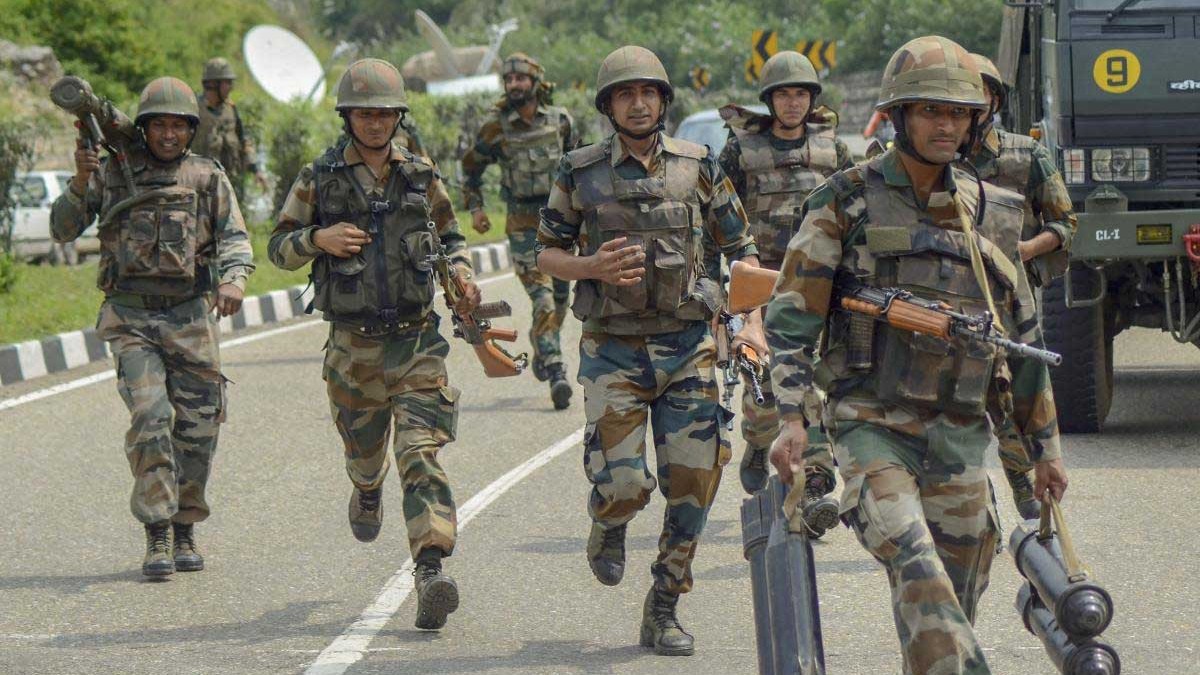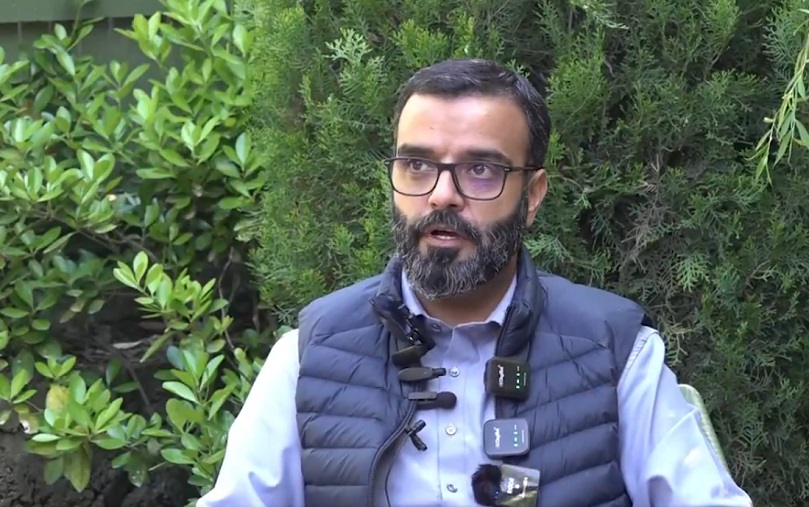Army Jawan Martyred in Landmine Blast Along LoC in Poonch | Agniveer Lalit Kumar Sacrifices Life in Service
By: Javid Amin | Jammu | 25 July 2025
Tragedy in the Mountains — The Poonch Landmine Explosion
In the early hours of July 25, 2025, the Line of Control (LoC) in Jammu & Kashmir’s Krishna Ghati sector, known for its rugged terrain and intense military significance, witnessed yet another tragedy. A routine area domination patrol by Indian Army soldiers ended in horror when a landmine exploded, killing one and injuring two others.
The martyred soldier has been identified as Agniveer Lalit Kumar, a braveheart from the 7 JAT Regiment.
Two of his comrades, including a Junior Commissioned Officer (JCO) and a fellow jawan, sustained injuries and were airlifted to a military hospital where they remain in stable condition.
This heart-wrenching event underscores the ever-present danger that Indian soldiers face along the LoC, where even the ground beneath them can turn deadly.
The Scene of the Incident — Krishna Ghati Sector
Where Is Krishna Ghati?
The Krishna Ghati sector lies in the Poonch district, a volatile region along the LoC in Jammu & Kashmir. Sandwiched between dense forests and steep ridgelines, this area has historically witnessed infiltration attempts, sniper attacks, and mine blasts.
Why Is It So Critical?
-
Acts as a corridor for infiltration from Pakistan-occupied Kashmir (PoK)
-
Regular patrolling is necessary to deter cross-border movement
-
Used frequently during anti-infiltration operations
-
Remains heavily mined, with both active and legacy mines from past conflicts
For Indian soldiers, patrolling this region is not just a duty—it’s an act of daily heroism.
The Agniveer Who Gave It All — Lalit Kumar of 7 JAT Regiment
The soldier martyred in the blast was Agniveer Lalit Kumar, a member of the prestigious 7th Battalion of the Jat Regiment, known for its gallantry and service in India’s most sensitive zones.
Who Was Lalit Kumar?
Lalit, who hailed from a humble family in a rural district of northern India, joined the Army under the Agnipath scheme, which recruits young Indians for four years of military service.
Despite being new to the force, Lalit had already won the admiration of his seniors for his commitment, discipline, and courage.
He is survived by his parents and a younger sister. The news of his death has shattered his entire village, where neighbors gathered in large numbers to mourn and pay tribute.
“He wanted to serve the nation with pride. He died a hero,”
— A friend from Lalit’s hometown
How the Incident Happened — A Routine Patrol Turned Fatal
Area Domination Patrol Explained
Indian Army soldiers regularly conduct Area Domination Patrols in border zones like Krishna Ghati to:
-
Deter infiltration
-
Ensure no movement of contraband or militants
-
Secure supply routes
-
Reassert control over disputed terrain
The Deadly Trigger
During one such patrol on July 25, the team unknowingly stepped over an old landmine, likely a legacy explosive device planted years ago either during Kargil conflict-era defensive mining or more recent anti-infiltration operations.
The blast was localized but powerful, instantly claiming Agniveer Lalit’s life and injuring two others.
The area was immediately sealed off, and additional troops were dispatched to assist.
Rescue & Medical Response
Despite the difficult terrain, the Indian Army’s casualty evacuation protocols swung into action within minutes.
Evacuation Details:
-
The injured soldiers were airlifted to a nearby Army base hospital using specialized helicopters.
-
Medical teams on standby ensured rapid treatment.
-
The condition of the JCO and the other jawan is reportedly stable, but they remain under observation.
Tributes from the Army & Nation
The Indian Army’s White Knight Corps, which oversees operations in the Jammu region, paid a solemn tribute to the fallen hero via social media:
“We salute the supreme sacrifice of Agniveer Lalit Kumar. We stand by the bereaved family in this hour of grief.”
Thousands across India, including former Army veterans, civilians, and politicians, also expressed condolences online.
Political Reactions:
-
Defence Minister Rajnath Singh tweeted:
“Deeply saddened by the loss of Agniveer Lalit Kumar. His sacrifice for the nation will not be forgotten.”
-
J&K Lieutenant Governor Manoj Sinha extended heartfelt condolences and emphasized that “every martyr’s legacy will be honored.”
Security Context — Why Now?
The landmine explosion comes amid heightened military vigilance in J&K. This is due to:
Ongoing Religious Pilgrimages:
-
Amarnath Yatra (in progress)
-
Budha Amarnath Pilgrimage (starting July 28)
Both events see thousands of devotees traveling across the state, making the region vulnerable to militant activity and infiltration attempts.
Preventive Operations
In light of the increased movement, the Army and paramilitary forces have intensified patrols, especially in sensitive sectors like Krishna Ghati, Surankote, and Mendhar.
Post-blast, search operations were carried out in surrounding forest belts and strategic ridgelines. So far, no infiltration or sabotage activity has been linked to the explosion.
The Hidden Enemy — Landmines on the LoC
Landmines have long been used by both India and Pakistan to secure their borders and deter cross-border movement.
Legacy of Past Conflicts:
-
Mines laid during the 1999 Kargil War and earlier remain buried across various stretches of the LoC.
-
Despite regular clearing operations, many mines remain undocumented due to shifting terrain, landslides, and waterlogging.
Risks to Soldiers
-
Unpredictable terrain movement can expose or shift mines
-
Rain and vegetation can hide warning signs
-
Most victims are patrolling units and local shepherds
Policy Debate — Should India De-Mine Its Own Territory?
The death of Agniveer Lalit Kumar raises a fundamental policy dilemma: Should India accelerate mine-clearing programs in its own territory, especially in peacetime zones?
Arguments For De-Mining:
-
Protect soldiers and civilians from accidental explosions
-
Fulfill international humanitarian obligations (India is not yet a signatory to the Ottawa Treaty banning landmines)
-
Improve mobility and reduce post-conflict risks
Arguments Against:
-
Mines act as a low-cost defense against infiltration
-
Terrain advantage in border zones depends on mined barriers
-
De-mining could create security vacuums in highly sensitive areas
For now, the government maintains a cautious stance, opting for partial de-mining and dynamic mapping rather than blanket removal.
Agniveer Scheme in Focus — Sacrifice Beyond Politics
Agniveer Lalit Kumar was among the first cohorts of India’s new Agnipath military recruitment scheme, launched in 2022.
About the Agnipath Scheme:
-
Recruits young men and women between 17.5–21 years
-
Four-year tenure with the option for 25% to be absorbed permanently
-
Designed to modernize and “youngify” the Indian armed forces
Despite political debates and protests, Lalit’s sacrifice is a reminder that valor is not defined by tenure.
He served with honor. And died a soldier.
Voices from the Ground — The Family’s Grief
Back in his village, Lalit’s family received the heartbreaking news with stoic silence. His father, a farmer, said:
“He left to protect the nation. Now the nation must stand by us.”
His mother, inconsolable, has yet to accept that her son will never return home.
Locals gathered to offer prayers and support. His funeral is expected to take place with full military honors.
Remembering Our Martyrs — A National Responsibility
Every time a soldier falls, the nation rises in tribute—on social media, in political speeches, in candle marches.
But tributes must go beyond symbolic gestures.
-
Financial compensation must be adequate and timely.
-
Families must receive emotional and social support.
-
Children of martyrs must be given free education.
-
Comprehensive insurance must cover long-term needs.
Anything less is a disservice to their supreme sacrifice.
Data Doesn’t Lie — The Toll of Landmines in India
Military & Civilian Casualties (Last 10 Years)
| Year | Fatalities (Army) | Injured (Army) | Civilian Casualties |
|---|---|---|---|
| 2015 | 5 | 9 | 6 |
| 2020 | 8 | 12 | 9 |
| 2024 | 4 | 6 | 4 |
| 2025 (so far) | 3 | 5 | 2 |
Despite efforts, landmines continue to be a silent killer, long after hostilities end.
Bottom-Line — The Price of Peace Is Eternal Vigilance
The Poonch landmine blast has once again illuminated the silent, shadowy dangers that define life along the LoC.
Soldiers like Agniveer Lalit Kumar stand as guardians not just of territory—but of the very peace and stability that the rest of India enjoys.
Let us not forget:
-
They patrol when we sleep
-
They bleed when we debate
-
They fall so we can rise
Their sacrifice must fuel not just sentiment—but policy, reform, and remembrance.
Final Tribute
Agniveer Lalit Kumar, your sacrifice is etched in the tricolor. India salutes you.


